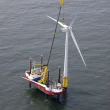A coalition of 17 U.S. states and the District of Columbia has filed a lawsuit challenging President Donald Trump’s executive order halting all wind energy development, in what marks a major confrontation between state climate ambitions and a federal push to revive fossil fuel dominance.
Filed in federal court in Massachusetts, the lawsuit targets an order issued by Trump on his first day back in office. It pauses approvals, permits, and federal financing for all onshore and offshore wind projects. The attorneys general argue that the president has no authority to unilaterally suspend the permitting process and accuse him of jeopardising economic investments, clean energy goals, and public health.
“This arbitrary and unnecessary directive threatens the loss of good-paying jobs and delays our shift away from fossil fuels that harm our health and planet,” said New York Attorney General Letitia James, who is leading the legal challenge.
The legal fight highlights a widening rift between the Trump administration and states pursuing ambitious climate policies. The White House, meanwhile, has intensified its own legal offensive, suing four Democratic-led states—New York, Vermont, Hawaii, and Michigan—over what it calls “burdensome and ideologically motivated” climate laws and pending lawsuits against the fossil fuel industry.
The U.S. Department of Justice last week filed lawsuits to block New York and Vermont from implementing recently enacted “climate superfund” laws that require fossil fuel companies to pay for climate-related damages. New York’s law alone aims to raise $75 billion to fund climate resilience and infrastructure projects. The Justice Department denounced the scheme as unconstitutional and a “transparent monetary-extraction” tactic targeting out-of-state firms.
In a separate move, the Justice Department launched pre-emptive lawsuits against Hawaii and Michigan to stop them from filing planned litigation against major oil firms. It warned such legal actions would “imperil domestic energy production” and interfere with federal environmental regulation and foreign policy. Yet Hawaii proceeded to sue major oil companies, including ExxonMobil, Chevron, BP, and Shell, on Thursday, accusing them of misleading the public about the climate risks of fossil fuels.
Michigan Attorney General Dana Nessel, who is preparing a similar case, dismissed the administration’s lawsuit as “frivolous” and “arguably sanctionable,” vowing to proceed regardless. “I remain undeterred in my intention to file this lawsuit the President and his Big Oil donors so fear,” she said.
The Justice Department cited Trump’s executive order declaring a “national energy emergency” to justify its actions. The order aims to fast-track fossil fuel permitting, repeal environmental safeguards, and withdraw the U.S. from international climate agreements. “These burdensome and ideologically motivated laws and lawsuits threaten American energy independence and our country’s economic and national security,” said Attorney General Pamela Bondi.
Back on wind energy, Trump’s administration has already blocked progress on Equinor’s Empire Wind project—a $3 billion offshore development intended to power 500,000 homes—despite its federal approvals secured during the Biden presidency. Equinor, majority-owned by the Norwegian government, is considering its own legal response.
Wind currently provides around 10% of U.S. electricity, making it the largest domestic source of renewable energy. The coalition of states suing over the executive order includes major clean energy investors like Massachusetts, New York, and New Jersey, which have collectively spent hundreds of millions to build offshore wind infrastructure and modernise grid systems.
Massachusetts Attorney General Andrea Campbell noted that offshore wind is central to delivering affordable, reliable green power and creating quality jobs. Her state has three large wind projects underway, including Vineyard Wind, which survived a U.S. Supreme Court challenge earlier this week brought by commercial fishing groups.
Meanwhile, international support for wind power continues to grow. UK Prime Minister Keir Starmer recently committed to major investments in wind at a global energy summit, while Nova Scotia plans to lease 5 GW of offshore wind by 2030.
The Trump administration has also suspended funding for floating wind research in Maine and revoked permits for projects in New Jersey, cementing its broader retreat from renewable energy.





















